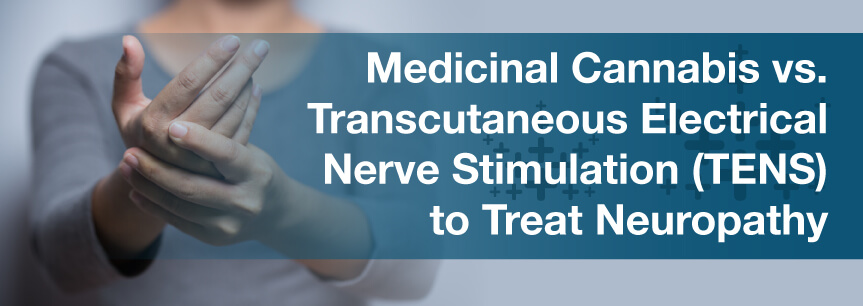
Neuropathy is caused by nerve damage, but it’s actually a symptom that signifies an underlying condition. For those with the disorder, also called peripheral neuropathy, pain, numbness and weakness in their limbs are continual issues.
Neuropathy interferes with a patient’s sleep, work, family life and mood. Whether your pain is chronic or acute, patients with neuropathy typically struggle to find treatment options that help them cope with their everyday life. There are many prescription and non-prescription treatments that attempt to mitigate the pain, including alternative options.
Transcutaneous electrical nerve stimulation (TENS) is a therapy option employed by some patients who suffer from neuropathy. Unfortunately, it’s not effective for everyone, especially those with chronic pain. Medical marijuana is an approved treatment option in many states for those who struggle with debilitating symptoms. Not only is it safe, but it’s known analgesic properties make it an excellent solution for those with neuropathy.
Neuropathy is a sign of an underlying issue doctors need to be aware of. This nerve damage can have many potential causes, such as:
Whatever its source, patients can have various symptoms associated with their neuropathy. Varying degrees of pain is the common sign shared by almost every patient. This type of pain is sudden and usually easy to treat. However, in some cases, neuropathy pain can become chronic, meaning the pain lasts longer and is harder to treat.
An alternative treatment being used by some patients with neuropathy is transcutaneous electrical nerve stimulation, or TENS. This therapy involves using an electrical device to treat nerve pain. Electrodes are placed on the skin over painful areas, and small electrical impulses are released. These inhibit pain signals from being sent to the brain.
TENS is generally used for acute pain, but it doesn’t work for every patient. Oftentimes, patients who use TENS only find relief while the impulses are being sent. TENS can be purchased over-the-counter for less than $50 at most drug stores, but some run hundreds or even over a thousand dollars.
Using a TENS device is generally safe, but there are some potential risks:
TENS are not recommended if a patient is pregnant, has a pacemaker or is experiencing numbness. If the patient is numb, they may not be able to feel if the TENS electrodes are burning them.
Although many patients have found relief by using a TENS device, it’s recommended that these be used in conjunction with other pain medications. So, even if a patient wishes to use TENS, they may also find relief from medical marijuana treatments, as well.
TENS is used for acute pain, but cannabis can treat all types of pain, including chronic. The effectiveness of marijuana to treat pain is proven by the number of patients across the country who are finding relief through this form of therapy.
Because an underlying condition likely causes neuropathy, there may be other symptoms a patient is struggling with, and TENS is only used to treat pain. Medical marijuana can treat many different symptoms associated with peripheral neuropathy, including:
If you have neuropathy and would like more information about how to become a medical marijuana patient in your state, you need to find a marijuana doctor. They’ll be able to assess your condition, see if you qualify and answer any specific questions you may have about cannabis. Medical marijuana dispensaries in your area are also staffed by helpful budtenders who can assist you.